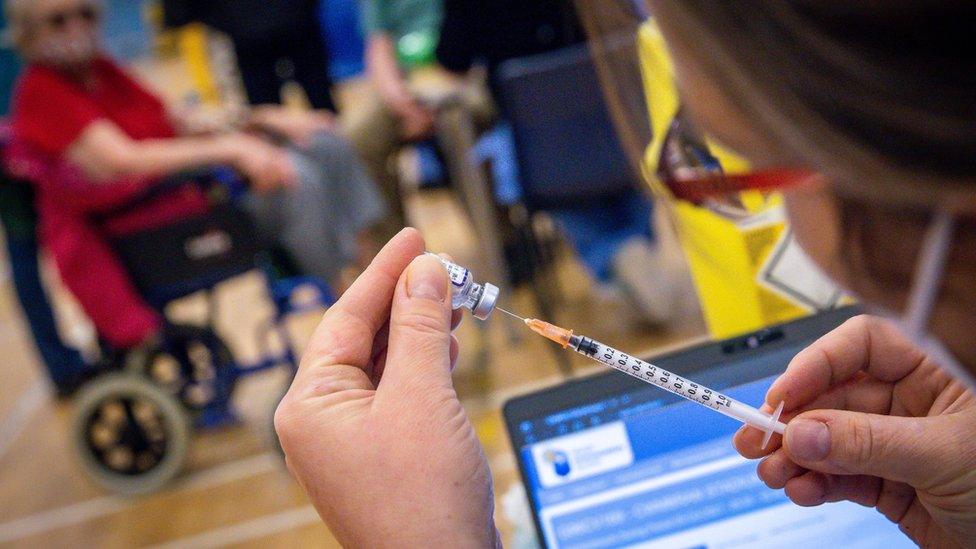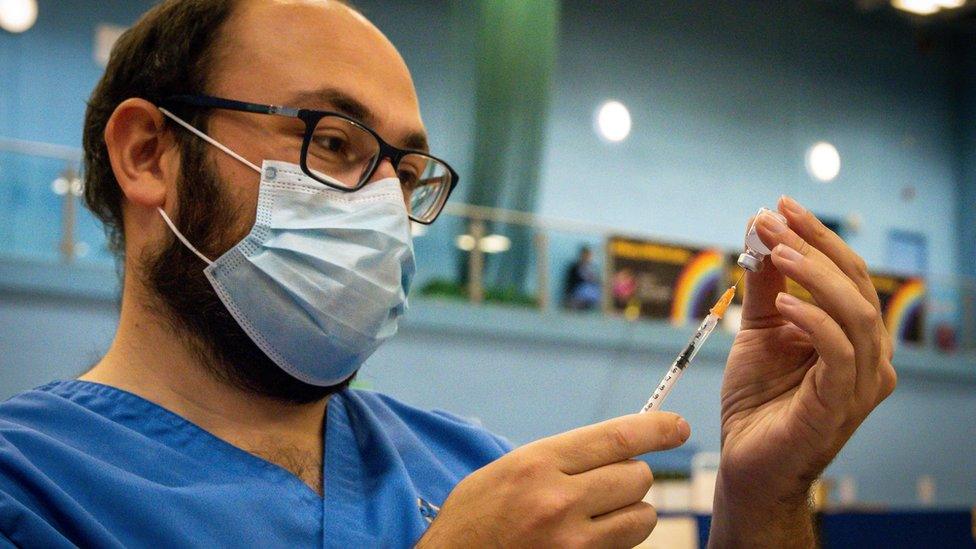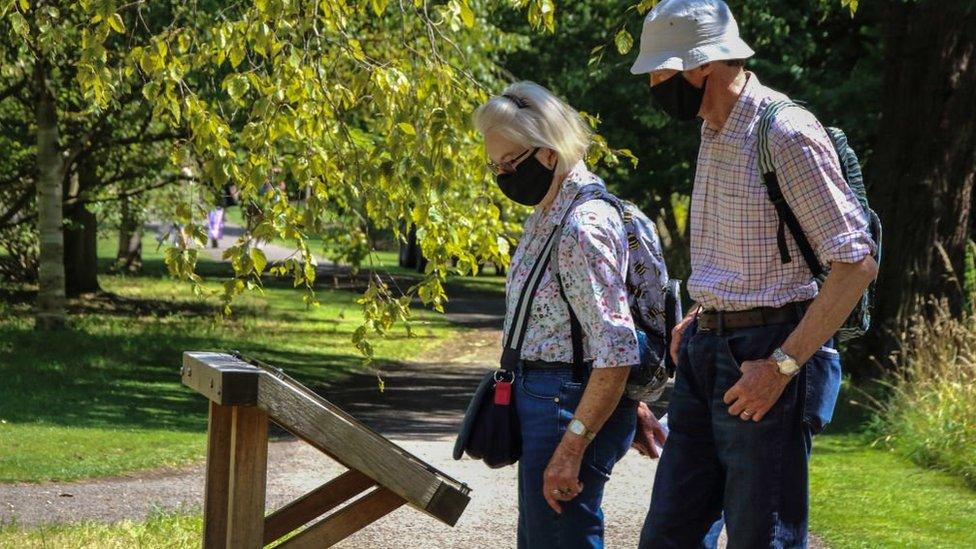Covid: Is the pace of the vaccine booster rollout too slow?
- Published

Boosters should be given at least six months after the second dose
In September, the government's scientific advisers recommended that everyone over 50 should be offered a third dose of a Covid vaccine, along with frontline medical staff and younger adults with some underlying health conditions.
At the time, ministers called the programme the "last piece of the jigsaw" as the country transitions to living with the virus. Some though are concerned that the speed of the rollout has not been fast enough to best protect the most vulnerable.
How many have received a booster?
A total of 30 million people across the UK will eventually qualify for a third booster vaccine because they are in one of the nine priority groups most at risk from Covid., external Only those who received their second dose at least six months ago are being asked to come forward.
Latest data from the NHS, external shows 3.7 million people in England have been given a third jab under the programme, offering them the fullest protection against the virus this winter.
According to calculations from the actuary John Roberts, from the Covid-19 Actuaries Response Group, which has been tracking the vaccine rollout, there are 8.5 million people now eligible for a booster if they want it.
That leaves 4.8 million who have had their second dose at least six months ago, but have not yet received that top-up.
He says that shortfall has been growing by about 800,000 a week as more people become eligible.
Allow X content?
This article contains content provided by X. We ask for your permission before anything is loaded, as they may be using cookies and other technologies. You may want to read X’s cookie policy, external and privacy policy, external before accepting. To view this content choose ‘accept and continue’.
Mr Roberts says his calculations show 46% of those aged 80 or older have now received a third dose, followed by 30% of those aged between 75 and 79.
He told the BBC's Today Programme: "If you project that [data] forward, then it's going to probably take us well into January before we get through those first priority groups.
"At the start of the booster campaign, the health secretary Sajid Javid said: 'We will protect the most vulnerable through the winter months'. But at the current rate it is going to be well through winter before we get through those first groups."
Scotland and Wales do not currently publish public data on the number of third booster doses given.
In Northern Ireland, the booster rollout has focused mainly on healthcare workers so far, with 5,291 of 82,911 people aged 80 or older given their third jab.
Why might the speed of the rollout matter?
Some research does suggest that, over time, protection from Covid vaccines may fade - or wane.
A study published in September, external by Public Health England found that vaccine effectiveness against symptomatic Covid fell from 67% in the early weeks after a second dose of the AstraZeneca vaccine, to 47% after 20 weeks.
Protection against severe disease and hospitalisation appeared to hold up better, decreasing from 95% to 77% over the same timeframe.

The UK got off to a fast start with its vaccine programme - jabbing the most vulnerable with first doses ahead of almost every other country in the world.
But that means the UK has a large number of elderly people who were vaccinated earlier and may now be seeing some of that protection fade.
Mr Roberts said: "The latest data from the UK Health Security Agency shows that, for the over-75 population, we are seeing around 500 deaths a week in people who are are fully vaccinated, because we know that the vaccine is very effective against serious illness and death, but not completely effective."
Since the first injections in December 2020, vaccines have been very effective at preventing hospitalisations and deaths. England's Deputy Chief Medical Officer Jonathan Van-Tam said last month that the programme had saved 112,000 lives and prevented 24 million cases of Covid.
More recently, Covid infections have been rising again across the UK, although the number of hospitalisations and deaths has remained well below the levels seen in earlier waves.

The Covid booster campaign started in September across all four nations of the UK (Wales pictured)
Why is the rollout not as fast as some hoped?
Working out how much vaccine is in the country is difficult, as the data is commercially sensitive and tends to be tightly controlled. But it's thought there are now about 20 million doses of Pfizer and Moderna vaccines in UK warehouses, so supply is unlikely to be the problem it was in the pandemic's early stages.
GPs and pharmacists, who are administering the bulk of the booster jab programme, are also having to deal with a major flu vaccine rollout this autumn, and there has been an increase in demand for doctor's appointments more generally.
Government adviser Prof Adam Finn, from the University of Bristol, explained: "The [booster] programme is much more complicated now than before.
"Previously it was a straightforward matter of opening up big centres and getting people in across the age cohorts. Now it's much more complicated with multiple different groups being offered vaccines.
"The booster programme will focus on the highest risk people first - so will see the most elderly and frontline health workers immunised as a priority."
A survey for the World Economic Forum in September, external suggested that 82% of UK adults of all ages who had already received two doses of a vaccine would take a booster shot if offered - one of the highest rates in Europe, but still below universal take-up.
An NHS England spokesperson said: "The NHS has delivered more than three million boosters in less than a month and at a faster rate than in December 2020.
"While the NHS continues to deliver first and second doses as well as rolling out the vaccine in schools, millions of people are being invited at least six months on from their second jab, which is in line with independent guidance."
Related topics
- Published2 April

- Published14 September 2021
